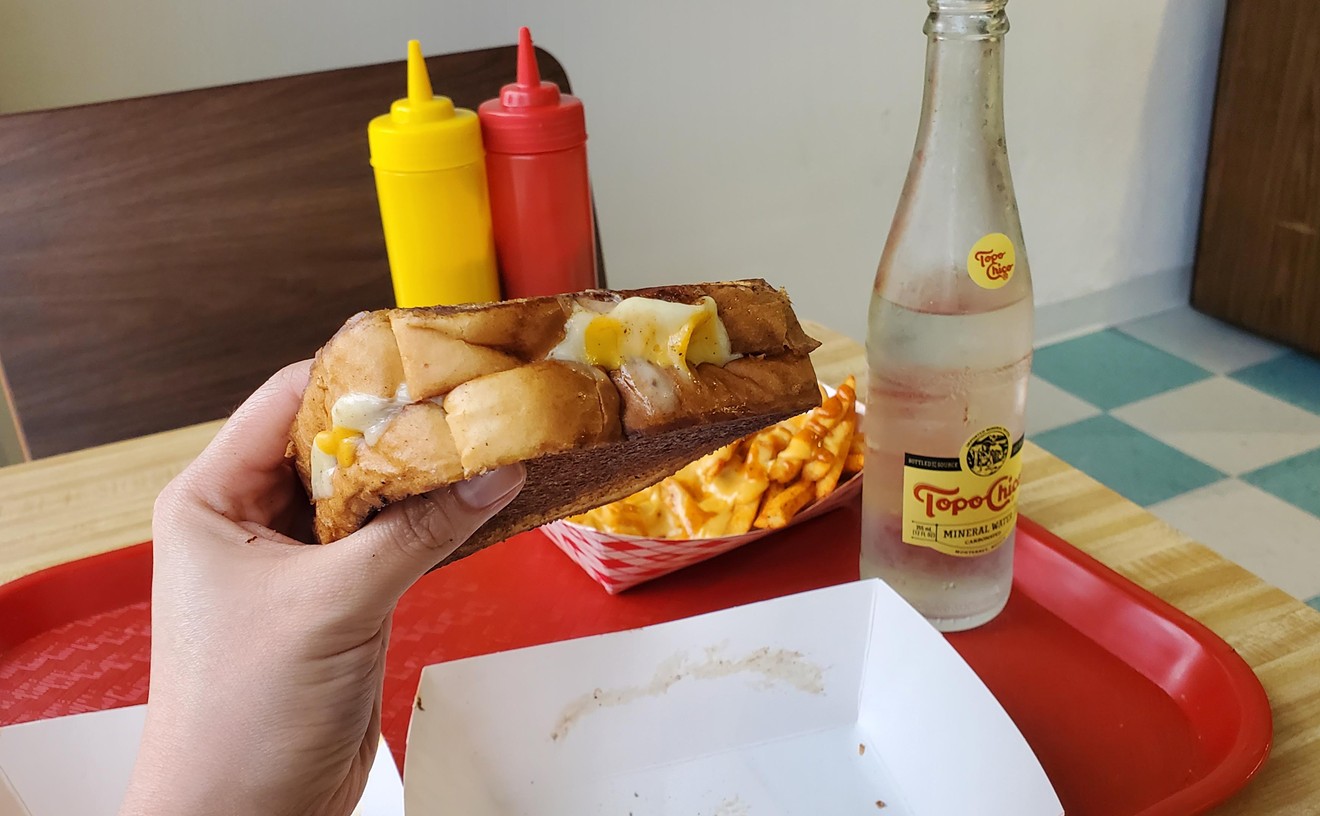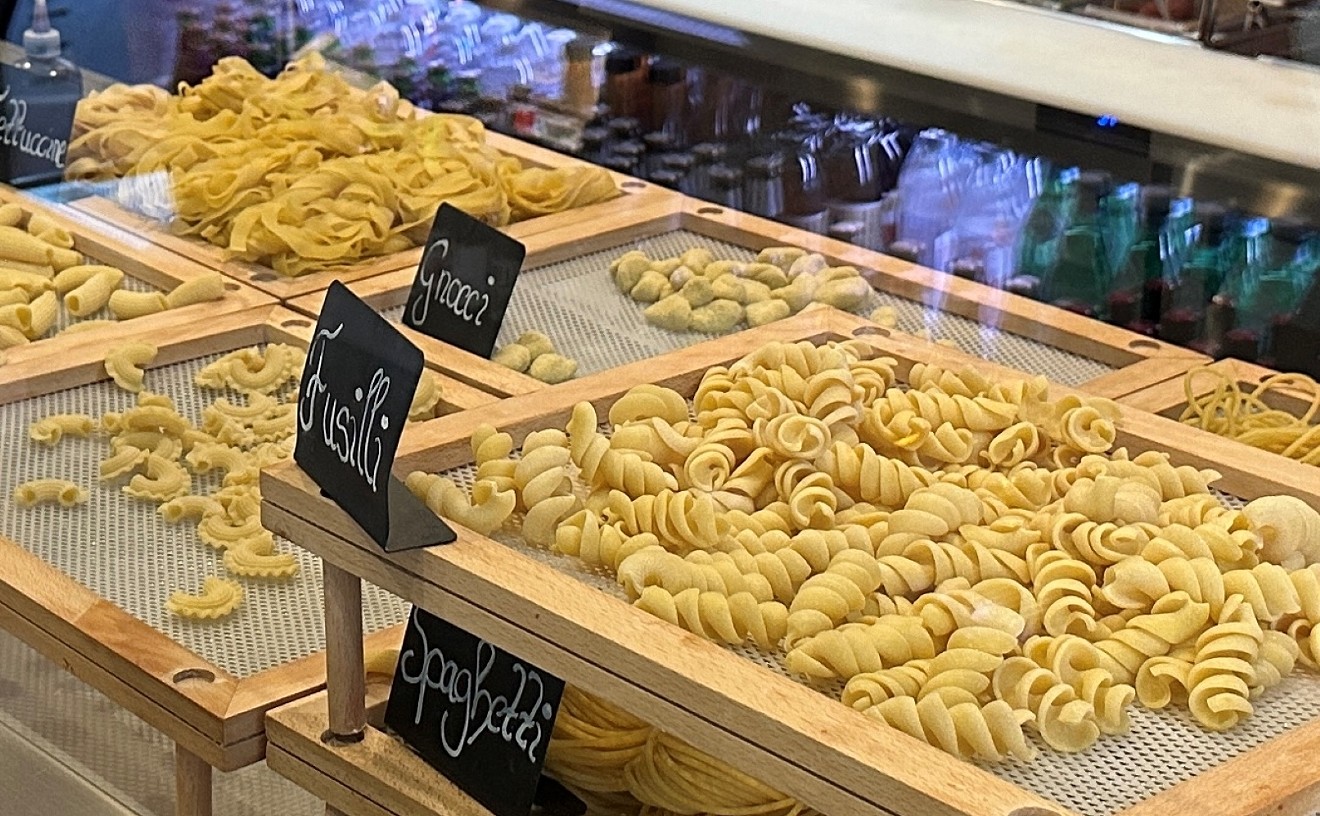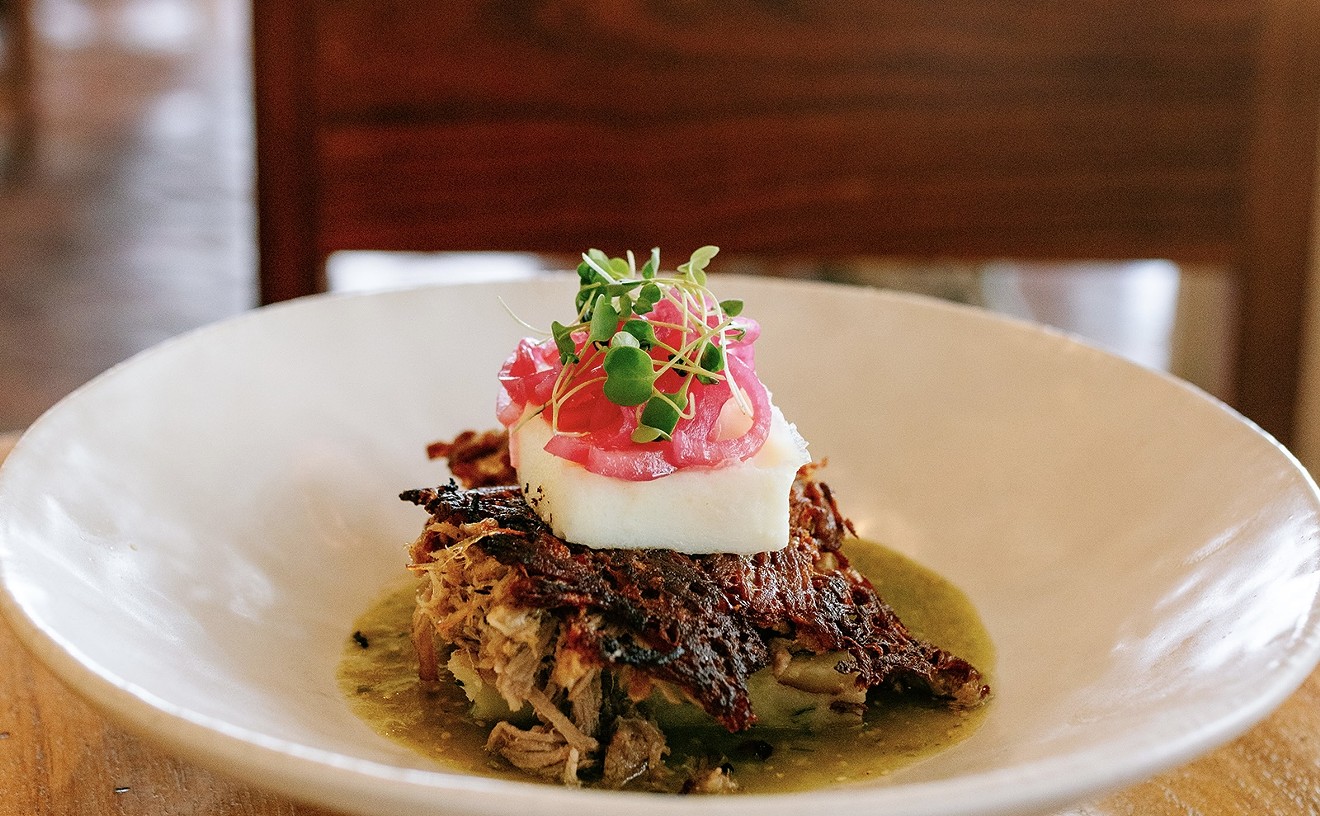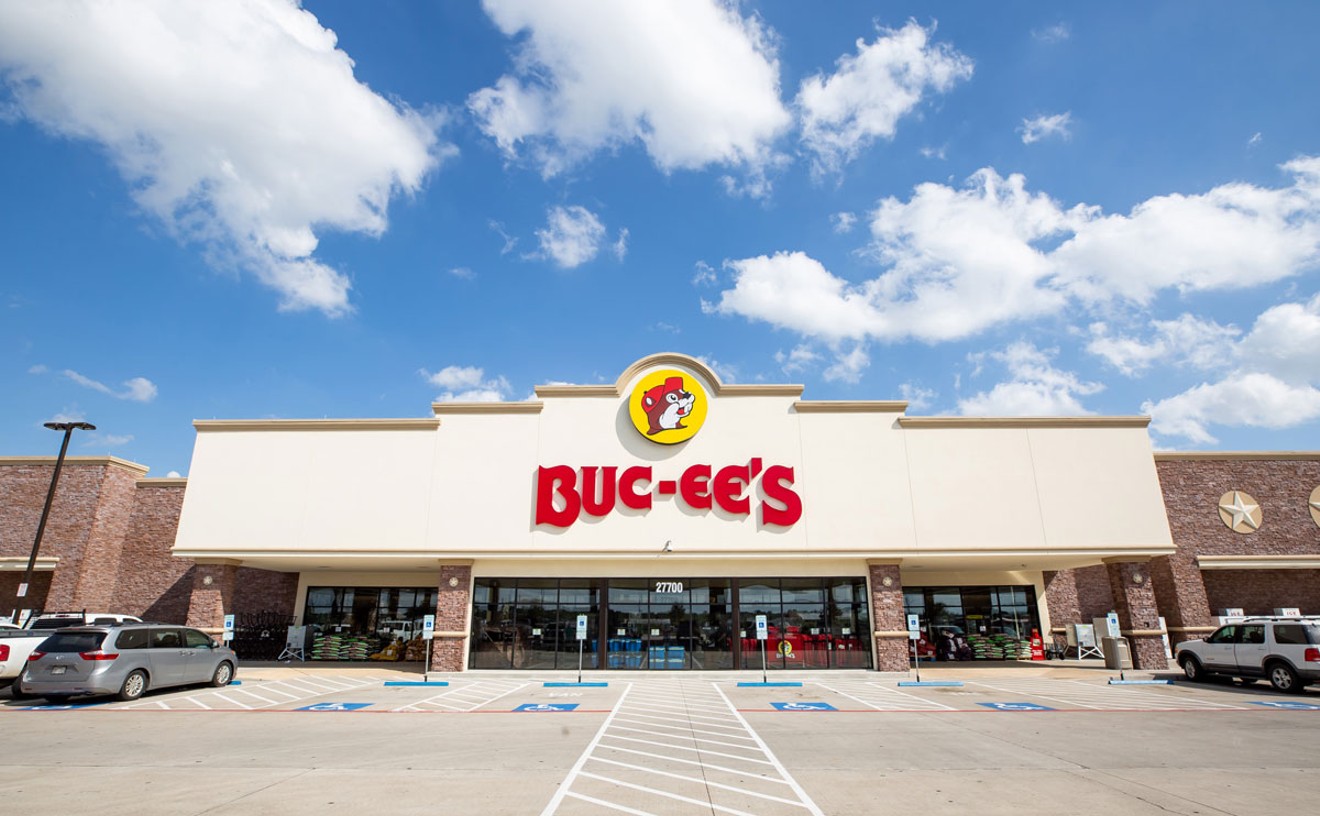For better or worse, the farm-to-table movement is in full swing in Dallas. It has catapulted chefs Graham Dodds, Matt McCallister and others into the national spotlight, and certainly affected on the way we eat in Dallas. But not every move toward a more sustainable, local food culture has been in Dallas’ fine dining restaurants. For the last 13 years, Garden Cafe has been committed to providing hyper-local (think in the backyard) food in a casual, diner-style environment.
For six of those years, Mark Wootton has been the driving force behind Garden Cafe’s renewed commitment to locally sourced ingredients and slow food. Ahead of his fundraising dinner on October 1 for Good Local Markets, we sat down to talk with Wootton about how he came to take the reins at Garden Cafe, his vision for a more sustainable, local future and how his long-beloved restaurant has adapted to the changes in the culinary world.
Can you talk about your culinary background before taking over Garden Cafe?
I started washing dishes in high school because I n eeded a job. A hotel opened up by my house, and I applied for anything, and next thing I knew, I was sitting around a table of 10 plates of beautiful food during a chef’s tasting. We had a short meeting, and they told me that I would start the next day. Because the restaurant was just opening, they had the executive chef of that restaurant and the executive chef of the hotel chain, and I learned from them. They trained me as if I were going to be on pantry or garde manger, and they taught me how to use a knife. Just some basics. They taught me how to cut an onion, and I naively thought that kitchens were messy places, and I scraped the scraps of the onion onto the floor, thinking I’d just sweep it up later.
The chef gave me a really hard time about it, and asked me who would clean that up later. I meekly told him that guess I would, and he asked me why I was making my job harder. Then I realized that those scraps could have gone into a stock or some other kind of use. That was just one example of the kind of environment that I fell in love with in kitchens. That strive for being he best you can, not allowing shortcuts, making the best use of product that you can — I loved that. Then I learned how to make mayonnaise. Even though I don’t really like mayonnaise, it taught me that cooking is really about science. It’s not just knives and fire and stuff, you know? I fell in love with cooking naturally, and then kept working in kitchens — I still am.
So how did you end up at Garden Cafe?
My dad started Garden Cafe 13 years ago, and he was in the middle of a really dramatic time in terms of management and people who didn’t really see his vision through. He had a team in place that just wasn’t really committed to the goals that he wanted to achieve, so he just thought about shutting down. Since I was leaving that other job, I asked him for a shot to take it over, and six years later, here we are.
Restaurants generally don’t last in Dallas for three years much less 13 years, why do you think this place has stuck around?
The biggest thing really is that my father, Dale, started this place to garden and create a restaurant that reminded him of the spots that he used to go to with his brothers. One in particular, his brother Darryl, they used to love going to diners. He wanted to build a communal, diner environment, while also working in the garden out back. Gardening is a huge part of his life, and in turn, a huge part of mine. It wasn’t necessarily ever about making money or showing up on the scene and exploding and fading out two years later. He knew what he wanted to do, and it was out of love, not out of necessity or money. It was all about creating something he loved and seeing his vision through.
It’s almost a little surprising that Garden Cafe was able to keep its doors open. Love and passion don’t necessarily pay the bills.
They don’t, and I think that’s where he was in 2010. There was a lot of love and passion in his heart and mind, and that hadn’t translated into how this place was operating. A lot of chefs and employees came in here thinking that this was a stop on the way to their next big deal. It was a breakfast-lunch diner, and they would pretend that they were all about it. But the service wasn’t on point, the food wasn’t there, the sourcing was off. The food wasn’t coming from local farms or the garden. It just wasn’t sticking to that original vision that he had.
For me, taking over at 22 with no experience was a chance to prove myself. I’ve always been interested in farming, much more so when I was 15-16, I really got into sustainability, better farming practices, local foods. When I started here, I was incredibly excited and worked really hard to bring up the quality of what had been served. I also wanted to bring up the quality of sources. I immediately reached out to Brandon Pollard at Texas Honeybee Guild and Nancy Taylor at Edible DFW to ask them who I needed to be talking to. They really, especially Brandon, took me under their wing. Any time there was a networking event or opportunity to meet people who could further that ideal, he would always help me. Now, there’s just this big world of local food activists, farmers, a huge cloud of people with the same ideals. They’re coming together in Dallas and really making this thing happen.
What do you think drove that change?
I think it was a pretty organic, natural progression. I don’t think that anything in particular drove it, I think it’s just been a natural progression since Chez Panisse over in San Francisco. Dallas caught on later than other cities, but it’s going really strong right now. It’s very grassroots, and a lot of organizing involved. People are showing up and being there as much as possible at any event that furthers these ideals. Food Inc. was also probably a major milestone nationally and internationally, Chipotle’s doing what they’re doing. People are looking into more alternatives.
Perhaps more interesting is your transition from fine dining to a casual breakfast and lunch spot. Do you feel like there are parts of your training that you’ve had to sort of pack away to really do this job?
Yes and no. In the beginning, definitely. I had taken over a restaurant eight years into its existence, and in those eight years, it got this reputation and customers were expecting certain things. Their expectations were cheap and fast, and they didn’t care where it was coming from. They weren’t looking for high-quality, local food. They just wanted a diner, and I wanted to make it something more than that. Its essence is still a breakfast and lunch spot, but now it has a different reputation because everything is from scratch and we’re treating those ingredients with respect. We’re planning the garden to maximize its use in the kitchen. In the beginning, it was tough because I had moved away from restaurants where there was a budget, but to me as a line cook, it seemed like an unlimited pocket. Where I could work with whatever I wanted. When I came to Garden Cafe, it was definitely a challenge for me. But it was also a great lesson in food costs, studying weekly reports and everything that is running a restaurant. I had to learn how to use QuickBooks and manage people on the fly. I had to balance what I wanted with what I could afford. I was able to, I had to, educate our customers to be able to buy what I wanted.
We used to buy eggs from a national distributor, and I finally found a source for pasture-raised, organically fed eggs, but at the time, I couldn’t get enough, and the price difference was huge. For a good few months, when we had those eggs, I put them on a menu as an upcharge. You could have the regular eggs, or these great pastured eggs for $1 more. I think a lot of people recognized the difference, and after a few months, I asked people on Facebook if they would mind if we raised all the egg dish prices by $1 so that we could get the best eggs possible. The answer was just a resounding yes. Everyone was all about it.
I felt much more comfortable in making that change because people trusted us to do the best that we could. Pretty soon, it will be all of the meat, which I’m incredibly excited about. That’s a high-price item, and it’s hard to source all the meat that you need from sustainable, earth-friendly farms. The fact that we’re on the precipice of doing that is just incredibly exciting.
Do you feel that you educated your consumer and they grew with you, or that your clientele changed completely when you started implementing these changes?
Both, definitely. Within six months of me taking over, we lost a lot of regulars and saw a huge dip in sales. I am very happy about that, because we lost the folks that wanted their diner. They can go have their diner somewhere else. I told my dad that he could make money now doing the things that he was doing, or he could wait a few years, give me a shot, and make money then. If you want to give me a shot, you’re going to see some money. I was bluffing a little bit, but I told him he would make money in three to five years.
And that’s how long it took. But the regulars that stuck with us from the beginning began to appreciate what we were doing, grew with us, and brought in a lot of people who were yearning for that. And also people who thought we were that before, and started coming back because we were actually practicing what our name implies.
Is it more challenging than you thought to work with ingredients coming from your own garden?
That’s the beauty of a chalkboard menu. If we were printing menus, we’d be doing it on a daily basis and running out of stuff every day. But with a chalkboard menu, we can go day-by-day and react to our harvest. If I get enough okra to run that as a special for the first half of the day but not the second half, we just erase it and figure out what else we have that we can replace it with. That adaptability makes it a lot easier.
That seems pretty unique in a restaurant environment. Most places are sticking with a menu for months at a time. Do you find that spontaneity makes you more creative?
Absolutely. We like to have everything for lunch ready by 11, which means that up until that deadline, I can come up with a special and put it on the menu. I or one of the other cooks can play around and get creative, and we taste it, and come up with a price, and throw it up on the board. That ability to do that is pretty great.
How would you say that your own garden influences the menu?
I feel like I have to always point out that what comes from the garden is less than 5 percent of what we go through. To visualize that, we use more than 150 pounds of red potatoes every week. When you consider every other ingredient that we have, it’s pretty clear that we can’t grow what we need out there. What we have does influence the menu, but not dramatically so.
It’s more about what the farmers we buy from have. Right now, we’re getting tons of really fresh shishito peppers at a great price, so they’re all over the menu. We do this eggplant-tomato dish, and we’re not growing either of those, but they’re both coming from a local farm when they’re in season. But we run out to the garden to see what kind of herbs we have to season them with. If we have rosemary and thyme but no basil, we’ll go with that. That’s not to say that the dish changes on a daily basis, but the seasoning and preparation will change from month to month.
How do you contend with that? Are there ever things that you plant that just don’t work, or aren’t great sellers?
There’s always something that I can use a fresh ingredient [in] that is going to be great. This year, though, I was expecting a lot more okra. We were a little behind in planting, and the rains in March really messed up our seedlings. At the same time, because we’re buying from farms in the same region as us, I can still get it. It’s not coming from our garden, which is a little bit of a bummer, but we can still get it. It’s been relatively easy to adapt to.
Speaking of that rain in the spring, it seems that plenty of other farmers were affected just as you were. Were there problems sourcing good produce in the dead of summer?
Oh yeah. A lot of farmers were going through a really tough time this summer. Some folks weren’t affected at all, others lost everything. That’s really sad to hear, and obviously it’s their livelihood that was just wiped out. Fortunately those that I do know that lost everything, they’re coming back strong now and will be OK. We have so many different farmer suppliers, and I know that they’re selling their stuff somewhere. There are some farms that I prefer over others, but if I know that one farm is having a really great year and another is struggling, I can buy more from them and adjust where that money goes.
Which is something in running a restaurant and buying so much food, you’re able to help so many people just in who you’re buying from. Not to mention that you’re helping the planet on an ecological level. You can directly touch that farmer. It’s not charity, they’re still giving you a product, but you can direct where that money goes to where it is needed most.
So, in the future, do you want to see more output from your own garden?
Absolutely. That’s always been the plan, from the very beginning. We’re limited with our space, and it is a full time job running the farm along with the restaurant. My dad is pretty much running the garden right now. It’s his baby, and he takes care of it. We’re always looking for ways that we can maximize the use of this land. We just bought eight acres in Southeast Dallas with a little house on it that we’re using as an Airbnb property, and one of our employees lives there with her husband.
We’re in the process now of turning that into an operating farm. We tilled a lot of land, built a goat pen, and got some chickens. We’ll have the garden here, the farm out there, and [be] growing much more of our own stuff. We’ll also have cool weddings and birthday parties in a venue that is literally seven minutes away from the cafe.
Aside from the food, what does the future look like? Will there be more Garden Cafes?
There will be more restaurants that come from Garden Cafe. Whether they’re called Garden Cafe or not is up in the air, and even that happening is years away. There’s going to be another in Dallas. We’re also working on buying whole pigs and whole cows from Falster Farms and setting up a retail program. We have a food manufacturers license, so sort of like what Brian Luscher did before he opened up Luscher’s. We have a lot of things coming in the future, but they’re a few years away.
Seems like that’s sort of the motto of this place — you’ve got to be patient and wait a few years before the good stuff comes.
This restaurant wasn’t started to be a hot spot out of the gate that was really popular for a few months and died away and the owners run off and try something else. Everything here grows really slowly and organically, and I love that. It means that we really put a lot of thought into our next move, and we really consider everything. We’re not going to go somewhere and pay $6,000 a month to create this happenin’ place. We’re buying land. We’re slowly building a farm. It’s exciting to spend a lot of time putting thought into your next move, and I think that’s what this place is always going to be about.
[
{
"name": "Air - MediumRectangle - Inline Content - Mobile Display Size",
"component": "18855504",
"insertPoint": "2",
"requiredCountToDisplay": "2"
},{
"name": "Editor Picks",
"component": "17105533",
"insertPoint": "4",
"requiredCountToDisplay": "1"
},{
"name": "Inline Links",
"component": "18349797",
"insertPoint": "8th",
"startingPoint": 8,
"requiredCountToDisplay": "7",
"maxInsertions": 25
},{
"name": "Air - MediumRectangle - Combo - Inline Content",
"component": "17105532",
"insertPoint": "8th",
"startingPoint": 8,
"requiredCountToDisplay": "7",
"maxInsertions": 25
},{
"name": "Inline Links",
"component": "18349797",
"insertPoint": "8th",
"startingPoint": 12,
"requiredCountToDisplay": "11",
"maxInsertions": 25
},{
"name": "Air - Leaderboard Tower - Combo - Inline Content",
"component": "17105535",
"insertPoint": "8th",
"startingPoint": 12,
"requiredCountToDisplay": "11",
"maxInsertions": 25
}
]










